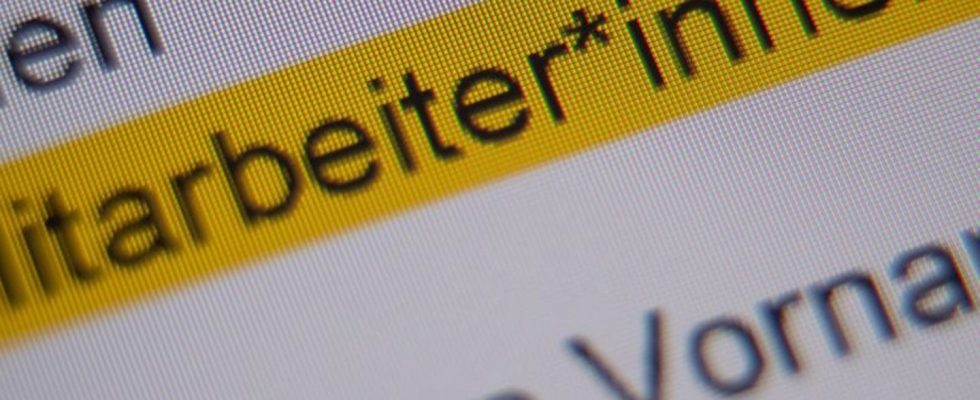Gender is discussed in schools, in the workplace and in politics. What is fair spelling? It remains difficult.
It remains complicated. There has been a social debate in Germany for a long time about the topic of genders with colons, underscores and asterisks in the middle of the word – such as “students”, “students” or “students”.
The whole thing has long been politically charged and keeps boiling up – in schools, at the kitchen table, at work. In everyday life it is about such questions as whether gender is counted as a mistake in an exam at school.
The whole debate and the wide range in the federal states will probably not change after the latest statement by the Council for German Spelling. Anyone hoping for a clear positioning that can be reduced to a simple common denominator was disappointed.
That’s what the council says
Even in the body, which is an important authority on spelling, the session on gender-equitable writing was very controversial, as the Council President Josef Lange reported on Friday in Eupen, Belgium. The council also came together because there were many questions from the authorities and schools in the run-up to how they should deal with the issue of gender.
Result: The Council for German Orthography does not classify gender symbols in the middle of words as a core component of German orthography. At the same time, in a new supplement on the subject of special characters, the Council lists the genders in the middle of the word – colon, underscore and asterisk.
Council President Lange told the German Press Agency that it was intended to describe the social phenomenon itself. The signs conveyed “superlinguistically charged” that all gender identities were meant. The Council takes into account that the phenomenon exists in society and is developing in terms of linguistic history.
At the same time, Lange added: “The gender star is not part of the core area of German orthography.” So there are still no regular characters. As a result, in a number of cases it could lead to grammatical problems. You have to keep watching it.
There were no other handouts. However, the Council sees its future work better systematized. From his point of view, Lange also made it clear that gender is not an orthographic but a socio-political discussion. The tension cannot be resolved with orthographic means. The spelling is merely a vehicle.
Government agencies must act
The Council’s task, on behalf of government agencies in several countries that use the German language, is to maintain the uniformity of spelling in the German-speaking area and to further develop the spelling, also with a view to changing the language.
The Council now wants to propose to the state authorities – in Germany the Conference of Ministers of Education and the Federal Ministry of the Interior are involved – to add the special characters section to the official set of rules. Only with the approval of the state authorities is there a binding effect. A hearing is now expected to follow, and a final decision could be made in December.
At the same time, the previous recommendations of the Council have not been rescinded, as the panel announced. Most recently, in 2021, the Council recommended not including asterisks, underscores, colons or other forms for identifying multi-gender designations in the middle of the word in the official regulations at this time.
Now it would still not be recorded regularly, but described as a phenomenon in the area of special characters. Among other things, the Council stated in relation to its recommendation that gender-equitable spelling should not make learning the written German language more difficult.
Political decision
The Council President summarized further on Friday: It is a political decision how to formulate administrative texts. On the subject of schools: There is a unanimous opinion in the Council that the standard German language must be learned in elementary school and that this could then be assessed more differentiated in higher school levels.
For years there has been a discussion in Germany as to whether – and if so, how – the masculine forms in the language can or should be replaced by broader terms – in order, for example, to include women more aggressively. The gender asterisk as with teachers is one possibility. Some put a colon or an underscore instead. In the spoken language and on television or radio, this is then expressed as a pause in speaking.
Bavaria’s Prime Minister Markus Söder (CSU) – the state parliament in the federal state will be elected this year – categorically ruled out an obligation to gender in Bavaria before the end of the session. “Everyone should take it personally as they want! But for Bavaria, there will definitely be no obligation to gender in the Free State…” Söder wrote on Twitter. Söder and the CSU have been campaigning on the topic for some time.
Another example from politics and the media: CDU leader Friedrich Merz positioned himself indirectly against gendering in public broadcasting at a CDU party conference in 2022 and said: “Universities, ladies and gentlemen, and public broadcasting are not public educational institutes.” The allegation was rejected by the broadcaster.
The issue of gender has also long since arrived in business and in the courts. For example, last year the Ingolstadt district court dealt with a lawsuit against a guide for gender-sensitive language at the car manufacturer Audi.

